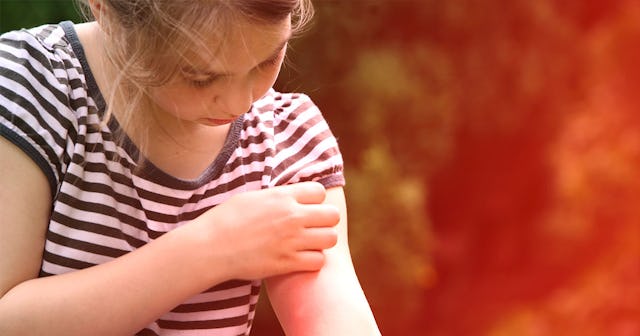Some Folks Are Allergic To Mosquito Saliva––It's Called 'Skeeter Syndrome'

Scratch, scratch, scratch. Itch, itch, itch. It starts at my ankle with a couple mosquito bites. Then the skin behind my knees where I have four more bites starts burning. Before I know it, I’m scratch-scratch-scratching and itch-itch-itching everywhere.
Before long, the bug bites on my ankles are bleeding and the ones behind my knees are red and raw. I spray them with Benadryl. No luck. I try the fingernail cross remedy. You know the one, where you press your nail – hard—into the bite in one direction and then the other so that it makes a cross in the hopes that the pain will distract you from the itching. It doesn’t.
Having grown up in the rural Midwest, I’m no stranger to the hell that is mosquito bites. This is just par for the course during the summer. Isn’t it?
Maybe, maybe not.
Well, first of all, some of us are more susceptible to these little suckers than others due to our blood type, body chemistry, and whether we’ve got a beer in hand (yes, that’s right; mosquitoes are attracted to beer).
While the itching and scratching goes away a few days for most of us, for some rather unlucky folks, this is just the start of the hell about to rain down on our epidermis.
According to Everyday Health, some people can get a more severe allergic reaction known as “skeeter syndrome.” I’m sorry, what?!? There is a worse condition that dozens of mosquito bites, scratched raw and bloody? No thank you.
Fortunately, skeeter syndrome is a relatively rate inflammatory reaction to mosquito bites. Symptoms can develop up to hours after the bite and may include a large area of swelling, heat, redness, itching, and pain that feels like an infection.
Suriyawut Suriya/EyeEm/Getty
Catherine Newman, MD, a dermatologist at the Mayo Clinic told Everyday Health that you can tell the difference between mosquito bites and skeeter syndrome caused by these miniscule vampires by the duration and size of the bite. For your more typical mosquito bites, the swelling and redness peaks about 20 minutes after the bite and is followed by small bites less than 3/4th of an inch wide. With skeeter syndrome, however, these suckers (literally) cause welts that might be up to four inches within an hour, worsening over time. The bumps might also be painful and warm to the touch.
“Skeeter syndrome is the result of an allergic reaction to proteins in mosquito saliva,” Newman told Everyday Health. “There is no simple blood test to detect mosquito antibodies in blood, so mosquito allergy is diagnosed by determining whether the large red areas or swelling and itching occur after you’re bitten by mosquitoes.”
Skeeter syndrome is more common in young children and babies, whose immune systems haven’t built up a natural immunity to mosquito saliva yet. People with immunodeficiency disorders may also be more susceptible.
So what can you do if you or your child are one of the poor, unfortunate souls that suffers from skeeter syndrome? Experts suggest trying long-acting oral antihistamines or putting ice or topical steroids on the affected area. In some cases, symptoms might be so severe that your doctor might prescribe prednisone or other oral steroids. Of course, this isn’t medical advice so see your doctor if you suspect a case of skeeter syndrome.
As unhelpful as it might sound, the best remedy might be to try to avoid getting bit by these devil bugs in the first place. I know, I know. Little good that does after you’ve been bitten.
I don’t know about you, but I’m itching all over right about now. Off to grab the Benadryl and DEET.
This article was originally published on